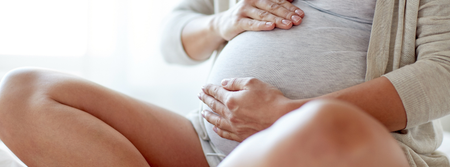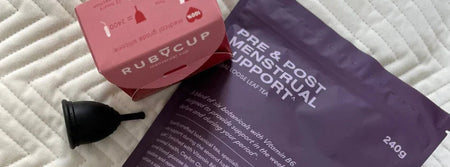This article is written by medical professional Dr. Alice Byram, whom you can read more about at the end of the article.
Tired of feeling down with PMS? Sick of the ups and downs? There are simple lifestyle changes that you can make to ease some of your monthly problems. Premenstrual Syndrome is very common among women in the lead up to their period.
Don’t let PMS ruin your month, have a look at our PMS problem solvers to what you can do to deal better with premenstrual symptoms and improve your month!
What Is PMS?
PMS (Premenstrual Syndrome) is used to describe premenstrual symptoms which occur in menstruators around the time of their period, specifically in the second part of the menstrual cycle1. Between ovulation and the first day of your period, your hormones levels rise and fall, and this fluctuation can cause changes to your body and your mood. PMS is common, up to 80%2 of menstruators are affected and most are able to deal with it using the tips below. However, for a few menstruators, the symptoms become extreme and impact on their life.
Period Symptoms, PMS Solutions.
Recognising the symptoms of PMS can help you minimise the impact they have on your life:
Physical symptoms:
- Tiredness
- Breast tenderness
- Bloating
- Headaches - half of all menstruators are affected by this3 and usually, paracetamol should be enough.
- Trigger for chronic conditions including epilepsy and migraines.
- Change in bowel habit: constipation or diarrhoea
- Special food cravings: you can justify your need for chocolate using a scientific basis
Psychological symptoms:
- Anxiety
- Low or alternating mood: If these feelings are extreme you may have PMDD and need to consult with a doctor.
- Sleep disturbances
5 Top Non-Pharmacological Ways To Beat Premenstrual Syndrome.
1. Exercise
Try to get some sort of exercise each day. It doesn’t have to be a gym session but can be a walk outside or other type of activity which fits in with your lifestyle and health possibilities. Exercise generally relieves tensions, stretches your muscles and release feel-good hormones. The days you have PMS your usual schedule may need to be adapted and this can be the case for the type of exercise you do.
2. Sleep well
Altered sleep patterns can be frustrating at the best of times, but when you are not feeling great a lack of sleep can make it even harder to get through the day. Practise good sleep hygiene and you will make it easier for you to get to sleep and deal with moments of insomnia.
- Have a regular bedtime which works for you. Don’t go to bed at 10pm if you get up at 8am unless you really need 10 hours. Similarly, don’t go to bed a 11.30pm if you need to get up at 5am.
- Buy an old fashioned alarm clock and leave your phone charging outside your bedroom.
- Try meditation or reading a book or listening to relaxing music in the hour before going to bed.
- Keep a sleep diary including what you did in the hours leading up to bedtime.
- If you do wake up, don’t reach for your phone but instead write down all your worries. Don’t try to find solutions at 4am. Do then pick up a book and think about that instead of the fact that you are not sleeping.
- If your problems sleeping last longer than 4 weeks, consult your doctor before you start taking any medications.
3. Diet
Eating a balanced diet throughout the month will help you be on form generally. Sometimes avoiding sugary foods and caffeine at time of PMS can help with symptoms but this is very individual. Try it out and see if it works for you. Fruit and vegetables will give you a good balance of the vitamins and minerals, and often eating more healthily will lead to you feeling better.
4. Relax
Clearing your mind and relaxing your body will make dealing with stress and anxiety easier. Have a bath, do yoga or go for a gentle walk outdoors. Different people need different solutions and with PMS it really is fine to stay inside if you are an introvert and that is how you recharge. Similarly, if you love a party, don’t let PMS stop you. Techniques such as biofeedback and and meditation may work for you.
When To See A Doctor.
For a few menstruators, the symptoms become extreme and impact severely on their life. If this is the case, consult your doctor and you may be diagnosed with PMDD or premenstrual dysphoric disorder. This condition, which only occurs at certain points in the menstrual cycle, needs expert input.
Treatments for PMDD and PMS include hormonal contraceptives, CBT or cognitive behavioural therapy, certain antidepressants, and lifestyle changes. Lifestyle changes are the first line of treatment and you should always try those first unless you are feeling unsafe.
Although you may have read recommendations to take certain food supplements but often there is no evidence to support these recommendations. Finally, PMS can be more intense at certain times in your life and then almost go away. It is worth making a note of which symptoms you have and when. Use an app or diary to work out when you are most likely to get PMS. Once you know that what is happening to you is due to PMS, that can be enough to help you deal with it.
_________________________________
Written by Dr Alice Byram Bsc Med & Surg UMA MA Hons MML Cantab
Dr Alice Byram was born in England to a French-British family. Following on from a degree in Spanish from the University of Cambridge, she went to Spain to study medicine. On her return to the UK, she worked in Emergency Medicine for several years before recently returning to Barcelona.
1Nevatte T, O'Brien PM, Bäckström T, et al. ISPMD consensus on the management of premenstrual disorders. Arch Womens Ment Health. 2013;16(4):279–291. doi:10.1007/s00737-013-0346-y
2Budeiri DJ, Li Wan Po A, Dornan JC. Clinical trials of treatments of premenstrual syndrome: entry criteria and scales for measuring treatment outcomes. Br J Obstet Gynaecol. 1994;101(8):689–695. doi:10.1111/j.1471-0528.1994.tb13186.x
3Deuster PA, Adera T, South-Paul J. Biological, social, and behavioral factors associated with premenstrual syndrome. Arch Fam Med. 1999 Mar-Apr;8(2):122-8










